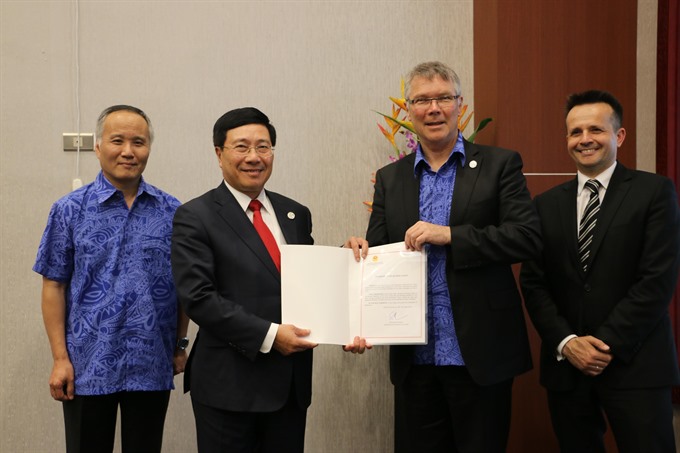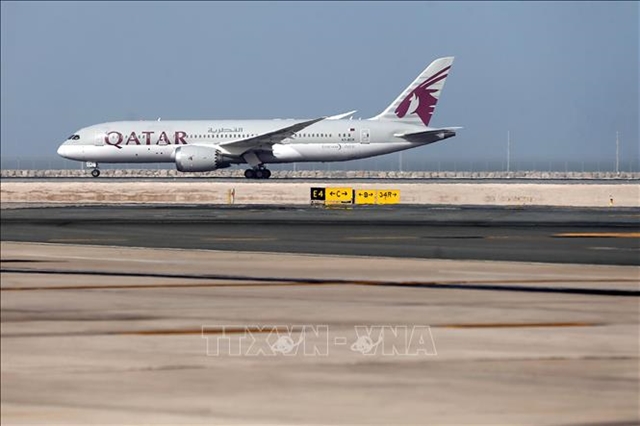 Politics & Law
Politics & Law

The Asia-Pacific, and in particular the Asia-Pacific Economic Co-operation (APEC), has remained a focus of Việt Nam’s foreign policy, Deputy Prime Minister and Foreign Minister Phạm Bình Minh said at the 30th Ministerial Meeting in Port Moresby, Papua New Guinea, on Thursday.
 |
| Deputy Prime Minister and Foreign Minister Phạm Bình Minh (left) hands Việt Nam’s document ratifying the Comprehensive and Progressive Agreement for Trans-Pacific Partnership to New Zealand Minister for Trade and Export Growth David Parker. - VNA/VNS Photo |
PORT MORESBY — Asia-Pacific, and in particular the Asia-Pacific Economic Co-operation (APEC), remains a focus of Việt Nam’s foreign policy, Deputy Prime Minister and Foreign Minister Phạm Bình Minh said at the 30th Ministerial Meeting in Port Moresby, Papua New Guinea, on Thursday.
This year marks the 20th anniversary of Việt Nam’s APEC membership. Therefore, the country would continue to work with other members to build an Asia-Pacific of peace, stability, dynamism, inclusion, connectivity and prosperity, he said.
Over the past nearly three decades, APEC has proven its value, he said, adding that in 2017, APEC affirmed its core values of free and open trade and investment, as well as its strong commitment to multilateral trade.
It has progressed in economic links, regional connectivity, quality and inclusive growth, and human resources development, the official noted.
Given the increased connectivity of the digital era, he underlined the need for APEC to spur sustainable, innovative and inclusive growth, as well as economic connectivity in the region.
Minh also highlighted APEC’s role in trade and investment connectivity and liberalisation and the settlement of global challenges.
APEC should co-ordinate regional economic connectivity mechanisms towards the formation of a Free Trade Area of the Asia-Pacific (FTAAP) and promote an open and transparent multilateral trading system – with the World Trade Organisation (WTO) playing a central role, the official said.
He urged APEC to continue pioneering structural reform, setting up central networks and innovative incubators, and promoting start-up spirit to turn Asia-Pacific into the world’s leading centre of technology and education.
APEC also needs to implement the action plan on inclusive growth and enhance its members’ capacity to access digital technology, adapt to and cope with changes and risks and harness co-operation.
Deputy PM and FM Minh called for efforts within APEC to build an ambitious post-2020 vision to serve the benefits of people and businesses.
Meeting New Zealand Minister for Trade and Export Growth David Parker the same day, Minh handed Việt Nam’s document ratifying the Comprehensive and Progressive Agreement for Trans-Pacific Partnership (CPTPP) to him, affirming it reflects Việt Nam’s determination to continue with reforms and widespread global integration, as well as to shape regional economic connectivity frameworks.
Parker affirmed New Zealand was ready to share its experience and assist Việt Nam in improving its capacity of law enforcement to tap into opportunities created by the pact.
In a dialogue with Japanese Foreign Minister Taro Kono, Minh asked Japan to make it easier for Vietnamese farm produce to enter the country and receive more Vietnamese trainees for work.
Deputy PM Minh and Australian Foreign Minister Marise Payne expressed delight at the development of bilateral ties over the years, especially since the upgrade of ties to the strategic partnership level in March 2018.
Hailing support between the two governments in regional forums, especially in mechanisms in which ASEAN plays a central role, Minh asked both sides to realise the outcomes reached during APEC Year 2017, especially initiatives on inclusive economic, financial and social development. — VNS




